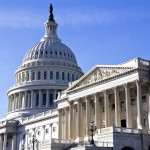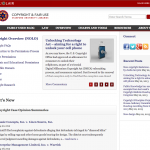Congressional recording available from the May 16 hearing on the Copyright Principles Project. You may need to move the play button pretty far in to get to it.
Here are the details:
A Case Study for Consensus Building: The Copyright Principles Project
Thursday 5/16/2013 – 2:00 p.m.
Subcommittee on Courts, Intellectual Property and the Internet
2141 Rayburn House Office Building
Witness List
Mr. Jon Baumgarten
Former General Counsel Copyright Office (1976 – 1979)
Professor Laura Gasaway
University of North Carolina School of Law
Professor Daniel J. Gervais
Vanderbilt University School of Law
Professor Pamela Samuelson
University of California Berkeley School of Law
Mr. Jule Sigall
Assistant General Counsel for Copyright Microsoft Corporation
Chairman Goodlatte: This afternoon we will hear from several participants in the Copyright Principles Project who collectively have worked on or studied copyright issues for decades. They have also traveled here from all over the United States and I thank them for their willingness to be here today.
By Direction of the Chairman
Statement of Judiciary Committee Chairman Bob Goodlatte Subcommittee on Courts, Intellectual Property and the Internet Hearing on “A Case Study for Consensus Building: The Copyright Principles Project”
Statement of Judiciary Committee Chairman Bob Goodlatte
Subcommittee on Courts, Intellectual Property and the Internet
Hearing on “A Case Study for Consensus Building: The Copyright Principles Project”
Copyright is a fundamental economic principle enshrined in our Constitution. It has become a core part of our economy and society in ways the framers of our Constitution could never have imagined. The ways in which creators could express themselves when the Constitution was written were very limited. Photography, musical recordings, film, and software did not arrive for decades, if not centuries, afterwards. Even many of these creations have changed significantly as digital technologies made the creation of content more diversified. Digital technologies have also enabled wider distribution to occur -local artists can have a global reach. The passion and skills of our nation’s creators have enhanced our society and culture. Creators deserve our support and respect.
Despite rapidly changing technologies and business models since the enactment of the 1976 Copyright Act, there appear to have been few efforts to bring together parties from different perspectives to discuss how the 1976 Act has worked as technology and business models evolve. There have certainly been short-term events where interested parties spoke for a few minutes each about the latest technology or the latest court decision. What has been lacking is something broader in perspective.
What impressed me about the Copyright Principles Project was not its report or even on what issues its participants were able to agree or disagree. In fact, the Committee does not endorse the specific recommendations and findings of the report. However, we do want to highlight that its participants with strongly held views on copyright law, many of which were in direct opposition to each other, committed to spending three years together in an effort to productively discuss copyright issues. The Committee has invited five of the participants here today as an example of how people with divergent views on copyright law can productively debate a range of copyright issues. Their written testimony highlights the fact that they are all here this afternoon, certainly not speaking with one voice, but speaking with a recognition that the person next to them at the witness table has just as much right to advocate their position on copyright law as they do.
This Judiciary Committee is no stranger to policy issues on which opinions vary widely. This hearing room has, and is continuing, to debate numerous policy issues in which there are sharp disagreements. There were of course sharp disagreements on the 1976 Copyright Act that we use today and whose hearing record in the Committee journals is before me.
Since announcing my interest in a comprehensive review of copyright law several weeks ago, a variety of interested parties began identifying their specific areas of interest that they wanted to see reviewed. I appreciate their input and I look forward to working with all interested parties. We should not be in a rush to focus on specific issues without first recognizing the fundamentals of copyright and the social and economic benefits that copyright brings to our economy. It is my intention to conduct this broad overview by hearing from everyone interested in copyright law as we begin by holding hearings on important fundamentals before we begin to look at more specific issues.
There are numerous questions that will be raised by interested parties during this review. I have several myself including:
How do we measure the success of copyright and what metrics are used?
How do we ensure that everyone’s voice is heard?
How is copyright working for individual artists?
How is copyright working for our nation’s economy?
These are only a few of the issues we will be looking into. This review of copyright law will not be a quick process simply because the issues are so numerous. However, we must undertake this review to ensure that copyright law continues to incentivize creativity and innovation in the digital age.





